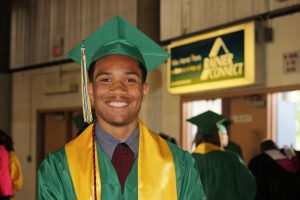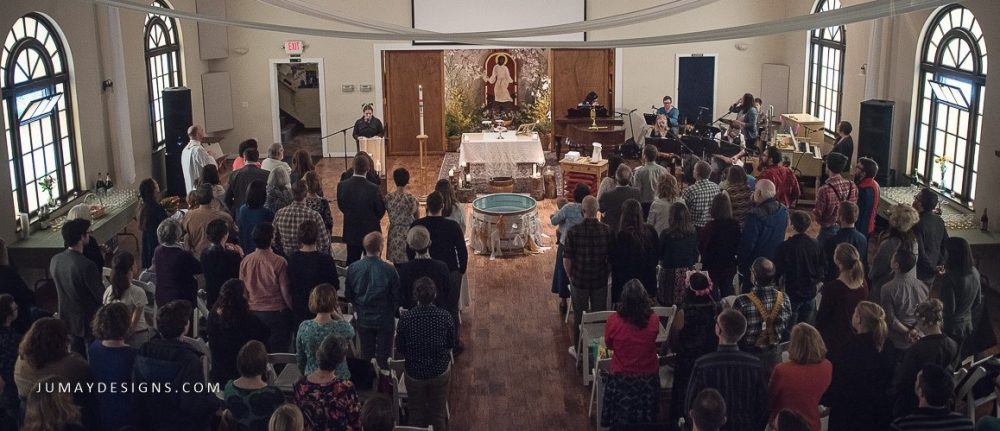As a high school student in Tacoma, a young man was at odds with his mom, and he no longer felt welcome to live at home. He found support at Peace Lutheran Church and through the church’s tutoring program, eventually living with a family of the church for a few years. Now he has taken some college classes, finished an internship at Peace Lutheran Church and Peace Community Center, and is moving forward in life. His name is Juwan, and here is his story, in his own words. — Pastor John Stroeh
 Like most Tacoma kids, my life started out as a struggle. But like a resilient underdog, I was determined to change the hand I was dealt into a royal flush. Know that I am a young man who loves to smile. But in my smile I hide a lot: years of pain and strain, of abandonment, lonely nights and heartache.
Like most Tacoma kids, my life started out as a struggle. But like a resilient underdog, I was determined to change the hand I was dealt into a royal flush. Know that I am a young man who loves to smile. But in my smile I hide a lot: years of pain and strain, of abandonment, lonely nights and heartache.
Years ago, I felt alone, empty, worthless.
You see, my mother and I started off like any loving relationship. She was my teacher, my madre and my best friend. She taught me wrong from right, how to tie my shoe and ride a bike (although it took me longer than most kids). She just stood with me. And picked me up when I fell down.
In the beginning of my junior year, my mother, the woman I love and care for with all the love that I have, began to go through a huge depression. The loss of her father, my grandpa, and the separation and ultimate divorce from the second man who promised he’d be there for her, no matter what, had devastated the loving and nurturing woman she was throughout my childhood. There were times when I saw her cry so many tears, from years of pain she had hidden away.
Depression, as we all know, is a tough issue to deal with. Over time she began to lash out and her sadness transformed into an uncontrollable anger. This anger turned into a beast that caused fights and turmoil in our household, and ultimately, in our mother-and-son relationship.
We began to fight. It started with verbal arguments, which turned into verbal punches to my heart and psyche. Things that I would never have thought would have been said began to come off her tongue like poisonous venom. Things like, “you’re not my son,” or “you’re never gonna be anything,” began to repeatedly spill from her tongue. “Hurt” and “confused” were simple words expressing the way I felt. Now I have these words to express my feelings in those times and in those circumstances:
Never in a million years would I have thought that things would’ve changed —
too fast did her love become pain.
Never did I imagine I would be sharing this story, but I’ll never put my mother down.
I used to think our past gave me the right — all those silly games we used to play transformed into horrific fights.
No longer was it lessons of wrong or right; no, it became, I was wrong and she always was right,
staying up at night praying that I might see a glimmer of God’s light.
You see, it started, I wanna say my junior year; yes, my junior year when I shed the most amount of tears (and she did too).
My grandfather was taken from this world while his baby girl held on;
saddest words ever when the doc said, “ma’am, your dad is gone.”
Same day I saw the life leave him, was the same day I saw life leave her.
Depression, we all know, is a furious beast and sometimes those who suffer from it lose themselves in its mitts.
Night after night, tears began to roll off her beautiful face;
oh, the beautiful face that raised six boys and one girl on her own.
Proud of momma for standing strong, even if she was alone.
The tears of sadness
turned to tears of madness as she lashed out on my siblings and me.
Childish arguments fueled with depression and heartache
left me alone, kicked out on the streets.
And the first time
was the worst time.
It broke my family apart.
I was me and they were them
and I had nowhere to go but to the church I called home.
And then it became the church against her.
But through the church I found my family again;
my family with God and the community.
Though we are not biological, me and my church family create a perfect unity.
They put me in a place to lay my head, put the smile back into my face;
and to a child all alone, they told me I would always have a place.
I’ve been on my own since the age of sixteen. Well, to say “on my own” would be a lie; through God’s mercy and love I’ve done things that can only be called a miracle. I’ve learned so many things through the church and the community. Things about love, life and happiness. Without the church and the community I can only say I don’t know the person I would’ve become or where I might have ended up. Thank God for being in my life, and the changes God’s continually making each day.
I’m a college student I will proudly say, who has had a bad past, lying in parks, cold nights in the dark. Who knew that with God and faith, anything is possible? My circumstances have helped mold me into the man I am, but they do not define me. No, what defines me is the faith I have in God because of the things in my past.
I would like to thank Peace Community Center and Peace Lutheran Church for always staying by me — sticking with me through the ups and downs, the battle with my mother — and the love they’ve helped me to find in myself. I thank God for putting the people there in my life, to help me take my life by the reins and flip the circumstances I was handed; flip them like an Olympic gymnast, into eventual accomplished dreams and fairy-tale endings. God, the church and community center have helped me to become the man I am today; the man that I am continually changing into. The man that God best sees fit.
The Rev. John Stroeh is pastor at Peace Lutheran Church, Tacoma. He is also a leader of the Homeless and Justice Ministries Network of the Evangelical Lutheran Church in America. This network provides strategic leadership and resources to ministries across the country to walk with the marginalized — those who struggle with homelessness, poverty, mental illness, reentry and addiction — to share the good news of Jesus Christ with people wherever they are. Learn more about the ministries of Peace Lutheran Church and visit the church’s website. Learn more about the Homeless and Justice Network of the ELCA.
edited by Kris A. Mainellis, Program Director for Communication and Events, Congregational Vitality

